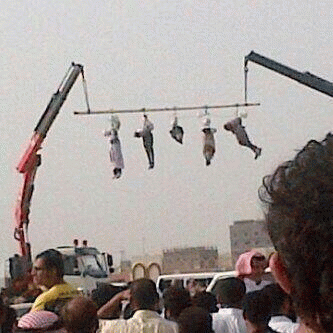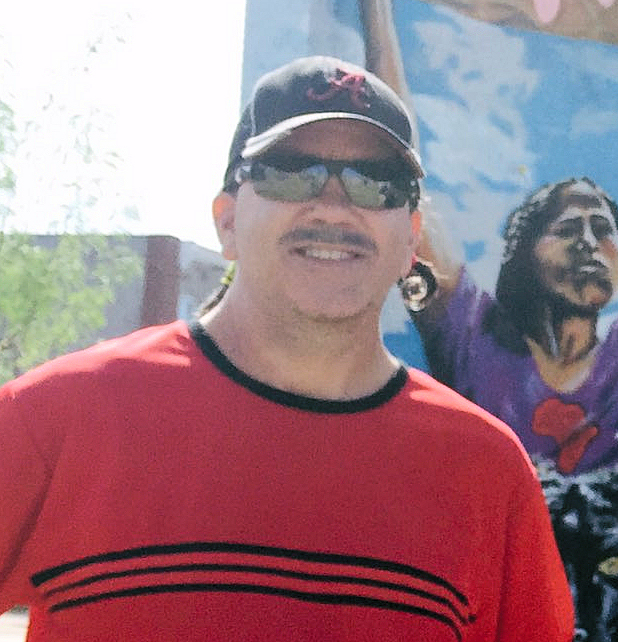In December 2011, the United States sold $30 billion worth of weapons to the Monarchy of Saudi Arabia. Included in the sale were 84 F-15 fighter jets, which are now "at the core" of the Saudi war in Yemen.
This fact, and numerous others about the Kingdom have received scant attention from proponents of the Saudi attack on Yemen.

Saudi Arabia publicly executes five men, 5/21/13
(Image by International Business Times) Details DMCA
Here's a look at five things about Saudi Arabia that US officials and the establishment media are neglecting to talk about as Saudi bombs continue to drop on the people of Yemen with the support of the United States:
- Sharia Law runs the country.
- Saudi Arabia is an authoritarian dictatorship: There are no national elections, no parties, and no rights.
- People are publicly beheaded in the Kingdom.
- Human rights for Saudi women are among the worst in the world.
- The monarchy is a cash machine for terrorists.
1. Sharia Law runs the country
The following quotes are directly from Saudi Arabia's Basic Law of Governance:
- "The King shall rule the nation according to the Sharia."
- "The Kingdom of Saudi Arabia is a sovereign Arab Islamic State. Its religion is Islam. Its constitution is Almighty God's Book, The Holy Qur'an""
- "Monarchy is the system of rule in the Kingdom of Saudi Arabia. Rulers of the country shall be from amongst the sons of the founder King Abdulaziz bin Abdulrahman Al-Faisal Al-Saud, and their descendants."
- "The Courts shall apply rules of the Islamic Sharia in cases that are brought before them."
- "The aim of education is to implant the Islamic Creed in the hearts of all youths."
"The Hanbali school, Islam's most orthodox which spawned the Wahhabi and Salafi branches, is embraced in Saudi Arabia and by the Taliban," according to the Council on Foreign Relations.
2. Saudi Arabia is an authoritarian dictatorship: There are no national elections, no parties, and no rights
On January 27, 2015, RT reported: "There are no national elections, no parties, and no parliament -- only a symbolic advisory chamber, known as Majlis al-Shura. Criticism is strictly forbidden: only last year, prominent opposition activist Abd al-Kareem al-Khoder joined hundreds of the country's political prisoners, when he was sentenced to eight years for demanding the changeover to a constitutional monarchy. Just days before King Abdullah's death, blogger Raif Badawi was given the first 50 of his 1,000 lashes -- for calling for free speech on his blog."
"Saudi Arabia's infamous "religious police" are employees of the Committee for the Promotion of Virtue and the Prevention of Vice. Their job includes ensuring that men and women do not mix socially, that people do not dress immodestly and that businesses close during prayer time," wrote Adam Taylor of the Washington Post.
Saudi Arabia was rated as "not free" and was given the lowest possible score in a January 2015 report by Freedom House, a nongovernmental organization that tracks human rights.
"Activist groups have estimated that there might be as many as 30,000 people imprisoned for political purposes. Last year, Human Rights Watch noted that a number of Saudi human rights activists were given lengthy prison terms on vague charges such as "setting up an unlicensed organization" and "disobeying the ruler," reported the Post's Taylor.
3. People are publicly beheaded in the Kingdom
"Saudi Arabia makes use of corporal punishment, including amputations of limbs, although floggings are most commonly used. Executions are also widespread. Both are performed publicly. Last year Amnesty International noted a "disturbing" rise in the number of executions in Saudi Arabia, which included public beheadings and "crucifixion" (which refers to the display of the body after death, rather than the term familiar in Christianity). In 2013, there were at least 79 executions, Amnesty says," according to Taylor.
The Kingdom publicly beheaded 19 people in the first half of August 2014 for offenses that ranged from drug smuggling to sorcery.
(Note: You can view every article as one long page if you sign up as an Advocate Member, or higher).





